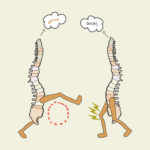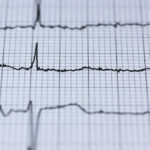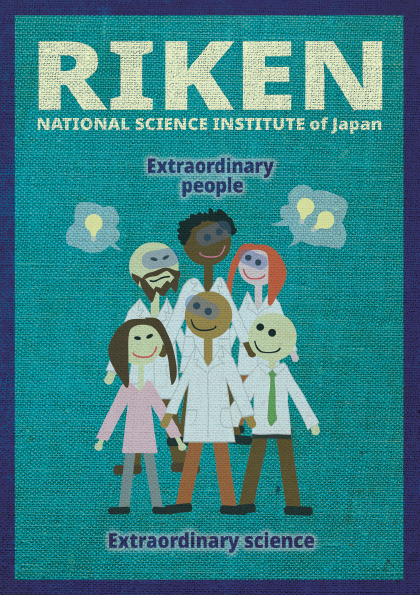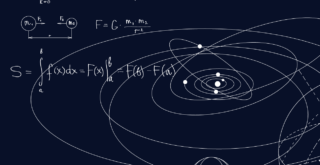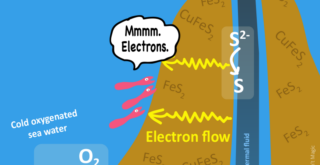On a rainy evening in mid-April, I trekked down to Good Heavens British Bar, in Shimo-kitazawa, Tokyo. I was heading to Space Café Tokyo, a monthly event held at said bar, featuring a rotation of interesting speakers who give brief lectures on space-related topics. This month’s event featured Dr. Kipp Cannon, a professor of physics at the University of Tokyo. He was going to talk not about physics, but about the science in sci-fi films.
This was going to be interesting.
Space Café has a cover charge of 1,500 yen, which includes a free drink. I ordered my drink and some vegan quesadillas and settled in to get schooled on bad sci-fi.
Cannon started with a clip from the film Total Recall. In the scene, the villain is exposed to the atmosphere on Mars and screams in pain as his eyes bulge out, his body expands, and his head explodes. This memorable scene, as Cannon explains, is highly suspect, given that space is a vacuum, and one wouldn’t be able to scream in a vacuum. Rather than screaming for a minute or two, the villain would likely experience a catastrophic loss of pressure.
What an awesome start to the talk. I added more hot sauce to my quesadilla and leaned in.
Cannon continued by explaining that scientists have a pretty good idea of what happens to the human body in a vacuum in space due to tests run by NASA with dog and chimpanzee subjects. And one human survivor.
Jim LeBlanc was an engineer at NASA in 1966 who was accidentally exposed to a near-vacuum when an experiment went wrong, and a hose connected to his pressurized suit became detached. Before passing out, he reported feeling the bubbling of saliva on his tongue. This all happened within seconds, so the prolonged screaming in Total Recall would have been unlikely. Along with the eyes bulging out and so on.

Dr. Cannon stands in front of presentation slide that
describes the actual effects of exposure to space on a human
body. Hint: they’re not good.
To give us an example of a sci-fi film he felt nailed a lot of real science in space, Cannon showed us clips of 2001: A Space Odyssey. Aspects of the film he praised included how sound was used (no sound in space, ya’ll!) or the issue of vacuum in space. Another issue he raised with sci-fi media in general was how all travelers in spaceships have somehow decided which direction is up!
I’d never thought about the spacecraft issue before. It may be easier to have two spacecraft “standing” in the same direction, but it would be fun for a film or show to feature a craft that pulls up sideways or upside-down in relation to the craft of the main cast.
My quesadilla was now resting in my stomach and Cannon’s talk was quickly coming to its conclusion. For the Q&A portion, I asked if he could recommend another film that had good science and he recommended the 2020 film Tenet.
Before finishing for the evening, he reminded us that if something “smells like BS, look it up.”
The next Space Café event will be on Thursday, May 23, 2024 at Good Heavens in Shimokitazawa.
On a rainy evening in mid-April, I trekked down to Good Heavens British Bar, in Shimo-kitazawa, Tokyo. I was heading to Space Café Tokyo, a monthly event held at said bar, featuring a rotation of interesting speakers who give brief lectures on space-related topics. This month’s event featured Dr. Kipp Cannon, a professor of physics at the University of Tokyo. He was going to talk not about physics, but about the science in sci-fi films.
This was going to be interesting.
Space Café has a cover charge of 1,500 yen, which includes a free drink. I ordered my drink and some vegan quesadillas and settled in to get schooled on bad sci-fi.
Cannon started with a clip from the film Total Recall. In the scene, the villain is exposed to the atmosphere on Mars and screams in pain as his eyes bulge out, his body expands, and his head explodes. This memorable scene, as Cannon explains, is highly suspect, given that space is a vacuum, and one wouldn’t be able to scream in a vacuum. Rather than screaming for a minute or two, the villain would likely experience a catastrophic loss of pressure.
What an awesome start to the talk. I added more hot sauce to my quesadilla and leaned in.
Cannon continued by explaining that scientists have a pretty good idea of what happens to the human body in a vacuum in space due to tests run by NASA with dog and chimpanzee subjects. And one human survivor.
Jim LeBlanc was an engineer at NASA in 1966 who was accidentally exposed to a near-vacuum when an experiment went wrong, and a hose connected to his pressurized suit became detached. Before passing out, he reported feeling the bubbling of saliva on his tongue. This all happened within seconds, so the prolonged screaming in Total Recall would have been unlikely. Along with the eyes bulging out and so on.

Dr. Cannon stands in front of presentation slide that
describes the actual effects of exposure to space on a human
body. Hint: they’re not good.
To give us an example of a sci-fi film he felt nailed a lot of real science in space, Cannon showed us clips of 2001: A Space Odyssey. Aspects of the film he praised included how sound was used (no sound in space, ya’ll!) or the issue of vacuum in space. Another issue he raised with sci-fi media in general was how all travelers in spaceships have somehow decided which direction is up!
I’d never thought about the spacecraft issue before. It may be easier to have two spacecraft “standing” in the same direction, but it would be fun for a film or show to feature a craft that pulls up sideways or upside-down in relation to the craft of the main cast.
My quesadilla was now resting in my stomach and Cannon’s talk was quickly coming to its conclusion. For the Q&A portion, I asked if he could recommend another film that had good science and he recommended the 2020 film Tenet.
Before finishing for the evening, he reminded us that if something “smells like BS, look it up.”
The next Space Café event will be on Thursday, May 23, 2024 at Good Heavens in Shimokitazawa.





